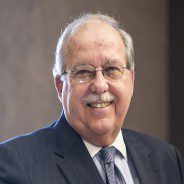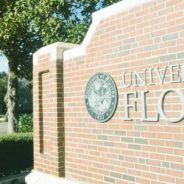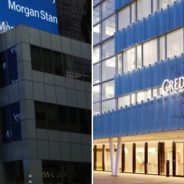Search results for return on investment:
Direct from the Dean: Joseph DiAngelo of the Haub School of Business
Joseph DiAngelo has been dean of Saint Joseph University’s Haub School of Business (HSB) since 2000, during which time the student body has doubled, making HSB the largest Jesuit business school in the country. Before that, he was dean of Widener University for 13 years. “I am the longest serving dean in the Philadelphia metro region,” he asserts proudly. Continue reading…
MBA Meaning Explained and How It Impacts Your Career
As people flock to business schools in 2022, the MBA is as in-demand as ever. You may have a non-business background and not even know what an MBA actually stands for. The MBA meaning is defined as a “Master’s in Business Administration”, a graduate management education for students. Upon graduation, students receive this degree after completion of their coursework.
An MBA Has a Measurable Meaning on Your Career
The impact of an MBA has measurable meaning on your career trajectory, ability to change careers, or ability to change industries. It also will make you a more desirable job candidate! The top five companies that hire MBA students include Amazon, Deloitte, Google, Bank of America Merrill Lynch, and PwC according to Career Protocol. Obviously, these companies are desirable among job applicants. Specific industries are also in high-demand for MBA graduates. These industries include Investment Management, Business Administration and Management, Consulting, Energy, and Information Technology.
The return on your investment of pursuing an MBA can be very lucrative. For example, U.S. News identified the Fuqua School of Business (Duke University) to have a 1-4.1 salary-to-debt ratio. The average salary and signing bonus within three months of graduating for the class of 2019 was $167,974, compared to the average debt of $119,125.
What Other Options are Available?
Although an MBA is the most popular graduate management education business degree, there are others gaining popularity. For example, specialized master’s programs offer similar curriculums but specialize in specific concentrations. These include MS in Accounting, MS in Business Analytics, MS in Finance, MS in International Business, MS in Management, and an MS in Marketing, among others. These programs typically cost less than an MBA and are shorter in length. If you want to pursue a specialized master’s degree, check out our Specialized Master’s Guide here.
The Annual Stanford Latino Entrepreneurship Initiative Survey
The Stanford Latino Entrepreneurship Initiative is a partnership between Stanford University and the Latino Business Action Network. Through research and education, they hope to expand the knowledge of the Latino entrepreneurial segment of the U.S.
The program is jointly supported by LBAN and the Stanford GSB Center for Entrepreneurial Studies. Each year a national survey is issued to assess the current state of U.S. Latino entrepreneurship. In doing so, this survey is developing a “significant panel of Latino entrepreneurs to enable longitudinal research to understand trends over time.”
Recently, the preliminary findings from the Stanford Latino Entrepreneurship Initiative’s (SLEI) annual survey of business owners were released. Some findings included “an overlooked high-return investment: If Latino-owned businesses (LOBs) were funded at parity with White-owned businesses (WOBs) to reach the same revenue distribution, they could generate $1.4 trillion in additional GDP today and $3.3 trillion in additional GDP in the year 2030.’ The findings also showed that, ‘Latino entrepreneurs are fueling the U.S. economic engine, responsible for approximately 50% of net new small business growth over the past decade (2007-2017).”
The preliminary findings, as stated in PR Newswire, indicate that “Latino entrepreneurs are responsible for about 50% of net new small business growth in the US over the past decade, according to data from 2007 to 2017, and they are growing in annual revenue faster than white-owned businesses. However, Latino-owned businesses have received just 1% of all investments from the top 25 venture capital and private equity firms over the past decade. And in 2020, Latino-owned businesses made up less than 1% of the $487 billion invested across a sample of the top 500 largest venture capital and private equity deals.” This research from Bain & Company, SLEI, and the Latino Donor Collaborative, shows that Latino-owned businesses hold great potential. They are, however, some of the most overlooked opportunities for investors.
According to another recent article from SLEI, COVID-19 has had a continued impact on Latino-owned businesses. They have “less cash on hand and when requesting funding from the Payroll Protection Program, Latinos have their PPP loans approved at half the rate of white-owned businesses. An even smaller proportion of Latino-owned businesses gets their full funding relative to white owned-businesses, 3% compared to 7%. We found one surprising exception: 82% of SLEI Education Scaling Program alumni received PPP funding compared to 18% of scaled Latino-owned businesses and 28% among scaled white-owned businesses.”
The Stanford Latino Entrepreneurship Initiative is bringing to light vital information about our current economy and the future of Latino businesses. More comprehensive data will be released in the State of Latino Entrepreneurship report at the annual State of Latino Entrepreneurship Forum in late January 2022.
New Flex MBA for Part-Time Students at Maryland Smith
The University of Maryland’s Robert H. Smith School of Business launched a new Flex MBA program through the school’s Baltimore, Rockville, and Washington, D.C. locations. Students can complete the curriculum, either online or in-person, in 24 months.
The new Maryland Smith Flex MBA program is designed for students with five to eight years of professional experience. The same faculty as the full-time MBA program will also be delivering the curriculum.
Paulo Prochno, Maryland Smith’s assistant dean for part-time MBA and online programs, spoke more about the program. “Students can select the pace and location that best suits their career goals,” he says. “The looming return to full, in-person classes intensifies the significance for MBA programs to accommodate, at a high level of quality, wide-ranging needs and preferences in terms of learning style and job requirements affecting availability.”
In addition to the core and elective courses, Maryland Smith Flex MBA students will participate in Business Decoded Saturday Seminars led by Maryland Smith professors. “The seminars will showcase the latest research to reveal what’s just on the horizon of business,” Prochno says. “Plus, these sessions also are open to alumni, providing the students with increased networking opportunities.”

Each location offers a different industry focus. In Baltimore, students can choose among General Management, Finance (Investment), and Innovation and Project Management. General Management is the focus for Rockville. And, Washington, D.C.’s primary focus areas are General Management, Finance (Corporate), and Digital Marketing.
Upcoming livestream Maryland Smith Flex MBA information sessions will take place at 6 p.m. EST on Tuesday, February 16th about Rockville, and Wednesday, February 24th about Washington D.C.
See the full announcement here.
The Top Executive MBA Programs

The top Executive MBA Programs are designed for professionals with significant managerial experience who want to move into leading roles within their organization, expand their career outside of their organization, or start their own venture. The “typical” executive MBA student has an average age between 30 and 60+. In addition, most programs require over 8-10 years of work experience being a C-Suite Executive, Entrepreneur, Small Business Owner or in Upper-Level Management.
| School Name | Length of Program (in months) | Program Start Date(s) | Average Total Students in Program | Current Students Top Industry Work Experience | Average Total Cost of Attendance |
|---|---|---|---|---|---|
| Anderson School of Management - UCLA Executive MBA | 22 months | September | 280-300 total students | High Technology, Health Care Services, Government | $167,000 |
| Booth School of Business - University of Chicago Executive MBA | 23 months | June | 220-230 total students | Investment Management, Technology, Consulting | $194,000 |
| Columbia School of Business Executive MBA | 20-24 months | May/August | 150-160 total students | Financial Services, Technology, Consulting | $213,000 |
| Fuqua School of Business - Duke University Executive MBA | 21 months | July | 180-190 total students | Sales/Business Development, Healthcare, Financial Services | $152,000 |
| Haas School of Business - UC Berkeley Executive MBA | 19 months | May | 140-150 total students | Technology, Health Services, Computer-Related Services | $194,000 |
| Kellogg School of Management - Northwestern University Executive MBA | 24 months | January/September | 120-130 total students | Technology/Media, Healthcare/BioTech, Financial Services | $217,000 |
| Ross School of Business - University of Michigan Executive MBA | 21 months | September | 165-175 total students | Ross Executive MBA lists 26 different industries in their 2022 class profile | $195,000 |
| Sloan School of Management - MIT Executive MBA | 20 months | September | 250-260 total students | Healthcare, Technology, Financial Services | $178,000 |
| Stern School of Business - New York University Executive MBA | 22 months | August/January | 240-250 total students | $204,000 | |
| Wharton School of Business - University of Pennsylvania Executive MBA | 24 months | May | 210-220 total students | Wharton Executive MBA lists over 3o industries represented in their 2022 class profile | $211,000 |
List of the Top Executive MBA Programs
MetroMBA has compiled a list of the top Executive MBA programs. In addition you can find resources for the most recent Executive MBA Rankings according to major publications such as U.S. News, Financial Times and The Economist.
Booth School of Business – University of Chicago
The Booth School of Business Executive MBA program is 21 months in length and is one of the only Executive MBA programs to offer classes in three continents. The Booth EMBA has primary campus locations in Chicago, London, and Hong Kong. Although students apply to a primary campus location, students take classes at each of the global campuses for their international experience.
In terms of program structure, it is important to note that each primary location has a slightly different offering. The Chicago class intake meets ever other Friday and Saturday over the 21-month program. In comparison, both the London and Hong Kong location is offered for 16 weeks over 21 months, and meet Monday mornings to Saturday afternoon.
Kellogg School of Management – Northwestern University
The Kellogg School of Business Executive MBA offers two primary U.S locations in Miami, Florida and Evanston, Illinois. Whether students choose the Miami or Evanston location, all students are taught by the same faculty and curriculum that is consistent with the Kellogg experience.
The program structure for students who attend the Evanston, Illinois campus includes taking classes Friday and Saturday, and on occasion, Sundays. Students attend classes two times per month with a 4-week intensive experience for student orientation and Global Network Week.
Students who attend the Miami, Florida campus meet one time per month from Thursday through Sunday on campus. Like the Evanston campus program structure, it also includes intensive weeks, however it only lasts three weeks for the student orientation and the Global Network Week.
Wharton School of Business – University of Pennsylvania
The Wharton School of Business Executive MBA has campuses in both Philadelphia and San Francisco. The program is approximately 24-months, which includes over 700 class hours.
The Wharton MBA is delivered in a modified, part-time schedule, in which classes are held every other weekend on Friday’s and Saturday’s at both the Philadelphia and San Francisco locations. The Wharton MBA also requires a one-week global experience for all students. Wharton offers three primary international programs in addition to the required global-focused core classes, international dual-degree programs, and consulting opportunities in emerging countries.
Columbia Business School
The Columbia Business School Executive MBA has a primary location in New York City, however, it also has partnerships with London Business School and the University of Hong Kong. This provides students an opportunity to pursue their degree over three continents.
The Columbia EMBA in New York city offers two options. The first is a Friday/Saturday option, in which classes are held between 8:30 a.m. – 6:45 p.m. every other weekend. This includes five terms within the curriculum. In addition, the Friday/Saturday option requires two five-day residencies held at the start of the first two semesters.
The Columbia EMBA Saturday option consists of six terms meeting every Saturday, over 24 months. Classes are held on Saturday’s between 8:30 a.m. – 6:45 p.m. It also requires two five-day residencies, held at the start of the first two semesters, like the Friday/Saturday option.
Stern School of Business – New York University
The Stern School of Business Executive MBA delivers a unique education that combines rigor in the classroom with engagement beyond the classroom, to broaden perspectives and change mindsets. Students earn 60 credits by completing the required coursework and attending scheduled classes.
The Stern Executive MBA begins with a one-week orientation residency where students begin classes and network with classmates. Students attend class on Friday and Saturday, every other week throughout the 22 month program. In addition, students participate in Global Study Tours to expand their learnings outside the classroom and build a more global perspective.
Fuqua School of Business – Duke University
The Fuqua School of Business Executive MBA program has one location in Durham, North Carolina. During each Executive MBA residency, students live, learn, and work on campus at Fuqua throughout the program.
The Fuqua EMBA begins with a 1-week immersion on Fuqua’s campus for an intensive learning experience and the opportunity to network. Students typically have one 3-day residency a month on Friday, Saturday, Sunday. Students also have hybrid distance learning periods in between. The program concludes with two one-week intensive sessions of electives and can also complete those courses remotely.
Haas School of Business – University of California, Berkeley
The Haas School of Business Executive MBA classes are held on-campus in Berkeley, California. During each block, you stay at the same hotel with your classmates, making it easy to collaborate, share strategies for work, life, and school, and build friendships.
The Haas EMBA is delivered over five terms, including one immersion experience per term. Classes hosted on-campus are Thursday-Saturday every three weeks. Twenty-five percent of your Berkeley Executive MBA curriculum is experiential, with five field immersions that explore leadership, innovation, entrepreneurship, international business, and business and public policy,
Sloan School of Management – MIT
The Sloan School of Management Executive MBA delivers its curriculum on their main campus, located in Cambridge, Massachusetts.
The Sloan Executive MBA is delivered via four weeklong modules for integrated learning, 26 weekend sessions for iterative development, and a one-week international project trip during the capstone Global Labs action learning experience.
Anderson School of Business – UCLA
Classes at the Anderson School of Business Executive MBA are held on-campus in Los Angeles, California. In addition to the on-site requirement, Anderson also offers three distinctly different countries for the Executive MBA students to choose among for their travels for their Global Immersion, with destinations in Asia, South America and Europe.
Anderson offers two flexible schedules for their students. The first is the bi-weekly schedule. Classes meet in person every other weekend starting on the 2nd weekend of the 10-week quarter. Classes begin at 10:00 a.m. only on the first Friday of each quarter. Classes then begin at 4:00 p.m. the following Fridays. After your first quarter, EMBA electives will be available on Sundays and during summer on a hybrid format.
The second option for Anderson Executive MBA students is the monthly schedule. Classes meet in person each month of the 10-week quarter: the 2nd, 6th, and 10th weekends. Additional instruction is delivered online each week. Like the bi-weekly schedule, classes begin at 10:00 a.m. only on the first Friday of each quarter. Classes then begin at 4:00 p.m. the following Fridays. After your first quarter, EMBA electives will be available on Sundays and during summer in a hybrid format.
Ross School of Business – University of Michigan
The Ross School of Business Executive MBA offers students two locations to complete their degree, including Ann Arbor and Los Angeles. At key points in the program, students from Los Angeles join fellow students in Ann Arbor to attend class, network, exchange ideas, and graduate as a group. Both offerings provide a Ross Executive MBA degree, general management curriculum, world-class faculty, once-a-month format, leadership development, and a full-service of executive accomodations.
The Ross Executive MBA requires once-a-month on-campus residencies. In addition, faculty and classmates stay connected through distance learning and online collaboration when not on-site.
The average weekly commitment for Ross Executive MBA students is 20 to 25 hours per week, although this varies by individual and course. Typically, students take three courses at a time. Exams are taken remotely, during a three-day, Friday-through-Sunday schedule.
Major Publication Executive MBA Rankings
As you research and compare Executive MBA programs throughout your journey, it is important to note major publication rankings for the top Executive MBA programs. You may be asking why it is important to consider rankings at all. We do not recommend this factor to be the only one to consider when choosing an Executive MBA. However, these programs participated in the rankings process with proven results to consider as a return on your investment. Below we have compiled the most recent rankings for U.S. News, the Financial Times, and The Economist to assist in your program search.
U.S. News Executive MBA Rankings
The U.S. News surveyed 477 MBA programs in fall 2019, which were accredited by the Association to Advance Collegiate Schools of Business International. The U.S. News took the following factors into consideration for their ranking;
Quality Assessment (40% total)
- Peer Assessment Score (25%)
- Recruiter Assessment Score (15%)
Placement Success (35% total)
- Mean starting salary and bonus
- Employment rates for full-time MBA program graduates
Student Selectivity (25%)
- Mean GMAT and GRE scores (16.25%)
- Mean undergraduate GPA (7.5)
- Acceptance rate (1.25%)
| Program | Ranking |
|---|---|
| Haas School of Business - UC Berkeley Executive MBA | 1 |
| Kellogg School of Management - Northwestern University | 2 |
| IE Brown - Brown University Executive MBA | 3 |
| Kellogg School of Management - WHU Beisham Executive MBA | 4 |
| Yale School of Management Executive MBA | 5 |
| Warwick Executive MBA | 6 |
| IESE Executive MBA | 7 |
| IMD Executive MBA | 8 |
| Kellogg School of Business - Schulich | 9 |
| Anderson School of Management - UCLA Executive MBA | 10 |
The Economist Executive MBA Rankings
The Economist has completed four biennial rankings for Executive MBA Programs. They are ranked on two broad measures:
- Personal development/educational experience
- Career development.
Personal development includes the following factors: the quality of students, student & faculty diversity, quality of faculty, and program quality. Each of these factors are weighted evenly at 12.5%.
Career development includes the following factors: career progression, salary and networking. Unlike personal development, the career development factors are weighted unevenly with career progression being weighted at 15%, salary at 27.5% and networking at 7.5%. All of these factors combined, contribute to the weighted rankings by The Economist.
| Program | Ranking |
|---|---|
| Booth School of Business - University of Chicago Executive MBA | 1 |
| Kellogg School of Management - Northwestern University | 2 |
| Wharton School of Business - University of Pennsylvania Executive MBA | 3 |
| Columbia Business School Executive MBA | 4 |
| Stern School of Business - New York University Executive MBA | 5 |
| Fuqua School of Business - Duke University Executive MBA | 6 |
| Haas School of Business - UC Berkeley Executive MBA | 7 |
| Sloan School of Management - MIT Executive MBA | 8 |
| Anderson School of Management - UCLA Executive MBA | 9 |
| Ross School of Business - University of Michigan Executive MBA | 10 |
The Financial Times Executive MBA Rankings
Participation in the Financial Times ranking is voluntary and at the business school’s request. The following criteria must be met for schools to be considered, including:
- Must be accredited by either the US’s Association to Advance Collegiate Schools of Business or Europe’s Equis.
- The EMBA must be cohort-based, with students enrolling and graduating together, and with at least 30 graduates each year.
The Financial Times takes many aspects into consideration with the most heavily weighted factors being students average salary three years after graduation, average salary difference between before the EMBA, and the number of articles published by a school’s current full-time faculty members in 50 academic and practitioner journals between January 2016 and July 2019. Executive MBA students can use the Financial Times to consider the ROI of their salary outcome and faculty prestige
| Program | Ranking |
|---|---|
| HEC Paris Executive MBA | 1 |
| Kellogg/HKUST Business School Executive MBA | 2 |
| Trium: HEC Paris/LSE/NYU: Stern Executive MBA | 3 |
| EMBA-Global Asia: Columbia/HKU/LBS Executive MBA | 4 |
| CEIBS Executive MBA | 5 |
| EMBA-Global: Columbia/LBS | 6 |
| Olin School of Business - Washington University Executive MBA | 7 |
| London Business School Executive MBA | 8 |
| Tsinghua University/INSEAD Executive MBA | 9 |
| Said School of Business - Oxford University Executive MBA | 10 |
Top MBA Recruiters: Goldman Sachs
As one of the largest lending, securities, and investment management firms in the world, Goldman Sachs (GS) sits in the top tier of the Fortune 500. The global firm, headquartered in New York City, was founded in 1869 by Marcus Goldman. Samuel Sachs, Goldman’s son-in-law, joined the firm in 1882. Over the next decade, GS evolved into a provider of commercial paper for those starting businesses, and in 1896 it entered the New York Stock Exchange.
Continue reading…
News Roundup – Berkeley MBA on Solving Homelessness, Fuqua Dean on Immigration, and More
Let’s take a look at some of the biggest stories from this week, including a Berkeley Haas MBA alum approaching the California housing crisis.
Andrew Hening, MBA 17, On Solving Chronic Homelessness – Berkeley Haas Newsroom
Berkeley Haas recently featured an interview with Andrew Hening, an alum of the Evening & Weekend MBA (EWMBA). Hening has worked with great results to to reduce homelessness in the Marin County area of San Francisco.
Hening, who graduated from the EWMBA program in 2017, is the Director of Homeless Planning & Outreach for the city of San Rafael, California. Before receiving his degree at Haas, he considered pursuing a career in law. He returned to his hometown of Richmond, VA after college to take a job as a paralegal, but realized that his passion lay elsewhere.
“I started taking time off to volunteer in the community,” he says. “I’d done a lot with youth and tutoring, but then I participated with a Project Homeless Connect event, which is essentially a resource fair for people living outside. It was my first exposure to homelessness, and it had a huge impact on me.”
Through his involvement with AmeriCorps VISTA, he accepted a job as the Santa Clara County Project Homeless Connect Coordinator in 2010. Hening then moved on to his current position in San Rafael which he has held since 2016. Since he began his tenure, homelessness in Marin County has dropped by 28 percent. Hening credits a “shockingly simple” process of identifying those who are chronically homeless, then providing Section 8 funding for them and hiring capable landlords and property managers who were sensitive to the homeless problem.
Of the wisdom he gleaned from his time at Haas, Hening says, “Being in the EWMBA program was amazing because I was constantly bringing fresh ideas back to the team—so many things that seemed tangential to homelessness but weren’t. For example, from our operations class, I was seeing ways to apply supply chains and turnover to our housing placements and the speed at which people become and resolve their homelessness.”
You can read here for more on Hening, his time at Haas, and his work on the California housing crisis.
Two Michigan Ross Alumni Recognized For Their Outstanding Contributions to the Ross Community – Ross News Blog
Michigan Ross recently honored Mark Petroff, MBA ’98, along with Cathy Bessant, BBA ’82 last month for their achievements in their respective fields. The award ceremony took place during Ross’ annual Reunion weekend.

Petroff, who received the Bert Wertman Alumni Service Award, serves as a mentor to students via the Michigan Ross Alumni-in-Residence program. He is the president and CEO of OneMagnify, a marketing and analytics company, and was formerly a partner in the Financial Advisory Services practice of Deloitte in its automotive industry segment. Petroff was also a general securities principal in Deloitte Corporate Finance LLC, the company’s investment services group.
Cathy Bessant, BBA ’82, received the 2019 David D. Alger Alumni Achievement Award for her accomplishments in FinTech. She is the chief operations and technology officer at Bank of America. She has also been acknowledged as one of American Banker’s “Most Powerful Women in Banking” for the third year in a row.
Bessant received honor on Institutional Investor magazine’s annual Tech 40 list of 2017, along with the OUTstanding LGBT+ Ally Executives in the Financial Times list of 2018. She also appeared on Working Mother magazine’s “50 Most Powerful Working Moms” list of 2017. You can read more on Ross’ alumni honors here.
Smeal Teaching Support Specialists Pave the Way in the Online Classroom – Penn State Smeal News
The Penn State University Smeal College of Business announced the integration of Teaching Support Specialists (TSS) to assist students in its highly regarded Online MBA (OMBA) program.
Janet Duck, faculty director of the OMBA, sought to increase student engagement through employing the mentorship of these specialists. The purpose of the TSS, Duck says, is “to drive engagement in the online classroom, and to inspire learning through contemporary application of content … [Mentors are responsible for] facilitating rich online discussions, providing feedback for students on formative assignments, guiding team projects, and moderating live video sessions.”
The specialists are themselves OMBA grads, so they’re able to impart first hand wisdom on the value of their degree. One specialist, Cheryl Horten, worked in the pharmaceutical industry for fifteen years. She says:
“Having completed Penn State’s iMBA, which is the previous incarnation of the OMBA, I not only have a love for Penn State, but an appreciation and understanding of what it’s like for these students … I empathize with working all day and coming home to do school work, while taking care of your family—this is an opportunity for me to help these students be successful.”
Duck describes online education as a “team sport” that will soon become the norm in today’s increasingly digital environment. The TSS program, she believes, is the start of a trend for MBAs pursuing online or blended degrees. “Ongoing peer-to-peer sharing and identifying professional development needs will be key to growing and evolving a customized student experience,” she says.
You can read here for more on the TSS program.
Dean Bill Boulding Leads Business School Push Explaining How Immigration Benefits Economies – Fuqua Insights
Duke University’s Fuqua School of Business Dean Bill Boulding recently visited the nation’s capital with a strong message. The economic success of the United States, he says, is reliant upon an inclusive and responsible immigration policy.
Boulding is chair of the Graduate Management Admission Council (GMAC), and he made his statement on behalf of fifty business school deans from across the country.
“Economists have long studied the connection between immigration and economic growth. Beyond the academic research, we also have GMAC data showing a significant shift in where students want to study around the world, which is an early indicator of which regions of the world are winning the talent race,” he says.

The statement came in the form of a public letter to U.S. government leaders and published in the Washington D.C. edition of the Wall Street Journal. It also received headline status in The Washington Post, The Hill and on NPR’s Marketplace.
The statement suggested some tangible solutions such as increasing the number of H-1B visas for well educated international workers possessing specialized skills. “A combination of our outdated laws, artificial regional and skills-based caps on immigration, and recent spikes in hostility are closing the door to the high-skilled immigrants our economy needs to thrive,” stated the letter.
You can read more on the GMAC statement here.
The 99 Percent Economy – USC Marshall News
Paul Adler, Professor of Management and Organization at the USC Marshall School of Business, has some strong words about the need for a vast shift in the U.S. economic system.
“We are already over the climate-change cliff,” he says.
“We need to find a way to mobilize a massive, sustained green R&D effort and drive the resulting new technologies into widespread use and abandon many economic assets that are environmentally unsustainable and get us all to change our living habits … and achieve all this in time to avert the collapse of ecological and social systems.”
His book, The 99 Percent Economy: How Democratic Socialism Can Overcome the Crisis of Capitalism, was released by Oxford University Press in October. Adler’s basic argument is that capitalism has brought enormous growth and well being to the U.S., but that the costs are growing more rapidly than the benefits. Climate change, he argues, has pushed our society to a crisis point. One of the most viable solutions, he argues, is a democratic form of socialism.
He suggests a variety of systematic changes for corporate organizations to set the groundwork for a sweeping change in the way the country’s resources, both natural and economic, are allocated.
For more on Adler’s work, read here.
News Roundup – Rutgers MBA Wins Big, HBS Professor Weighs in on EY’s Recent Press, and More
Let’s take a look at some of the biggest stories from this week, including a Rutgers award winner, and much more.
Student’s Excitement for Business Problem Helped Her Win Award – Rutgers Business School News
The National Black MBA Association recently honored Rutgers Business School MBA student Livonia Mitchell with the “Best Presenter” award in its annual case competition last month. It was Mitchell’s first time participating in such an event.
Fiat Chrysler Automobiles sponsored the competition, which includes students from 36 other schools. Students were required to present a case for how Fiat Chrysler could make a subscription car program profitable. They were required to present a marketing plan and a business model.
Mitchell, Director of Operations Excellence at Ports America, says of of her win, “The story really spoke to me … I connected with it. I think a lot of that came out.”
She is currently enrolled in RBS’ part-time MBA program, and plans to declare a concentration in Strategy and Leadership. For more on the competition at the Rutgers award winner, you can read here.
Enlightened Solutions: Modular Housing Developments for L.A.’s Homeless – UCLA Anderson School of Management News & Events
Two recent grads of the UCLA Anderson MBA program got some incredible news this month.
Their proposal to the LA City Council for housing for the homeless is to receive major funding to go forward. The nearly $24 million was granted to Greg Comanor (’19) and Aaron Sassounian (’19) to make their capstone project a reality.

The two created a project which combines affordable housing units, health care, and other services into one development using a for-profit model. Using Anderson’s Business Creation Option, the pair raised seed money with a friends-and-family campaign, and purchased a site in L.A.’s Watts neighborhood.
Comanor says of their concept, “Aaron and I were both real estate-focused students, coming from backgrounds in venture capital, investment banking, retail and multifamily development …We felt a nudge to do something socially conscious.”
In order to make the project truly come to fruition, they formed Daylight Community Development, which uses shipping containers to create modular units with the help of creative financing strategies.
Daylight’s Executive Director Tim Kawahara says of Daylight’s team, “They have identified a market niche where financial returns and social impact intersect. These are the types of solutions we need in order to build our way forward.”
You can read more on Daylight and their projects here.
Scholarship to Honor Professor John Dealy’s Commitment to Gender Equity in the Technology Industry – Georgetown McDonough School of Business
This month, Georgetown University’s McDonough School of Business established the Dealy Scholarship, a merit-based award for students who exemplify the values of gender equality in technology, finance, consulting, or other business fields.
Prashant Malaviya, Senior Associate Dean of MBA Programs at McDonough, says, “Gender equity is important to the future of business—whether in an MBA program or a corporate boardroom, there is tremendous value in diversity and inclusion … We are excited to begin awarding the Dealy scholarship to individuals who show [this] commitment.”
All applicants to the full-time MBA program will be eligible for the award, but they must show the qualities exemplified by Healy’s legacy. Joe Verbrugge (MBA ’97), says:
“John represented the reason you’d want to go to a school like Georgetown. [He] was the epitome of ‘we are all created equal’ here. He believed that whether you are a man or a woman, it’s about effort, diligence, and the creativity you bring to the work in front of you … He nurtured women leaders in a space where there aren’t a lot of women leaders; he gave amazing opportunities to anyone who put in the effort.”
Dealy passed away in 2017 after courageously fighting leukemia. His daughters, Anne and Marian, are both graduates of Georgetown. Anne, an attorney, and Marian, a microbiologist, were both present to comment on their father’s gift to the school and to his family.
“This scholarship is a very sweet recognition of my Dad,” Anne says. “He would very much appreciate [its] generosity and vision.”
You can read more on the Dealy family and the scholarship here.
NYU Stern Broadens Scope on Risk Assessment and Management with its Newly Expanded Volatility and Risk Institute – NYU Stern News & Events
NYU Stern recently announced the expansion and renaming of its Volatility and Risk Institute (VRI).
Since its creation a decade ago, the Institute and its associated V-Lab have provided measurement in real-time, along with forecasts of volatility for a vast array of financial assets.
The VRI will be directed by two NYU Stern faculty: Nobel Laureate Robert Engle, Professor of Management and Financial Services and creator of the V-lab; and Richard Berner, Professor of Management Practice and former Director of the Office of Financial Research
Raghu Sundaram, Dean of NYU Stern, says:
“I’m delighted to have Rob and Dick, two world-renowned experts on risk management, lead our newly expanded Volatility and Risk Institute … it will be a dynamic interdisciplinary hub [to] bridge the conversation between academia and industry, and to inspire novel research projects to address and manage the changing nature of risk facing today’s global firms.”
For more on the VRI, you can read here.
Women At Ernst & Young Instructed On How To Dress, Act Nicely Around Men – Huffington Post
Robin Ely, Professor of Business Administration at Harvard Business School, recently offered her perspective on some strange advice offered by Ernst & Young at a training forum, which was held in its new Hoboken office in the summer of 2018.
Among the bizarre pointers offered in the “Power-Presence-Purpose (PPP)” training program, geared toward women at EY, were “a good haircut, manicured nails, and well-cut attire that complements your body type… [But] don’t flaunt your body―sexuality scrambles the mind … Signal fitness and wellness.” Other sections of the program included highly questionable statements about the differences in brain size and differences in ability between genders.

Professor Ely, whose expertise lies in race and gender relations in various organizations, says, “There’s not a lot of empirical support [for these] trait differences between men and women … This curriculum is shot through with that assumption.”
Ely has conducted research on law firms that found predominant focus on outmoded stereotypes in companies that had a low percentage of women in the higher ranks. A former EY employee has spoken out about the training and the overall culture of the firm which focused largely on advancing men. Women make up only 12 percent of EY’s lead client service partners, she notes.
“The only way to succeed at EY is to work around the men. I heard that over and over,” she says. For the full Huffington Post article, read here.
Top 5 Paying MBA Careers: Marketing
MBA graduates in marketing can experience exponential career growth. According to Payscale, graduates in marketing often earn a starting salary of $55,700, which may double to $116,000 by mid-career. As the job is links to sales success, bonuses can also be lucrative.
Those who relish the thrill to sell might be curious about what positions can maximize their salaries. The benefits of these positions can vary by location, experience, and company.
News Roundup – Florida Rankings Get a Boost, Stanford Worries About the Internet, and More
Let’s take a look at some of the biggest stories from this week, including Florida rankings getting a nice boost for its graduate programs.
Tepper Hosts International Energy and Commodity Markets Conference – News & Events
Carnegie Mellon’s Tepper School of Business hosted the 2019 Annual Meeting of the Commodity and Energy Markets Association (CEMA) last month.
CEMA, founded in 2017, brings researchers and practitioners with an interest in topics like cryptocurrencies, energy storage, renewable energy, and climate change. CEMA and Tepper’s Sustainability Initiative work closely address these issues and help develop research into practice and policy. The 2019 event was organized by two prominent faculty at Tepper: Nicola Secomandi, Professor of Operations Management, and Head of the Ph.D. Program; and Duane Seppi, The BNY Mellon Professor of Finance and Head of the MS in Computational Finance Program.
Secomandi says of the event, “It makes sense to do it here …My research focuses on energy and commodities, and other Tepper faculty share similar research interests.”
Thirty sessions comprised this year’s program, along with two keynote addresses. Professor of Financial Economics Burton Hollifield and Emilio Osambela, former Tepper School faculty member and Senior Economist at the Federal Reserve Board of Governors, presented a headlining research paper regarding the investments choices made by environmentalists.
Bo Yang, a Tepper Ph.D. student, along with Secomandi and Selvaprabu Nadarajah (Ph.D, ’14), presented a research paper on methods of optimizing merchant energy production. Tepper alumni Michel Robe (Ph.D. ’95) and Sheridan Titman (Ph.D. ’81) delivered a presentation on agricultural futures markets.
For more on CEMA and the 2019 meeting, read here.
Five Hough Graduate Programs Earn Top 5 Ranking Among Publics for Second Year – Warrington Newsroom
The University of Florida’s Hough Graduate School of Business received high rankings for five different graduate programs by the Eduniversal Group.
Hough’s MS in Management was ranked first overall among public universities in the U.S., and the MS in Real Estate was voted first overall of its kind for the second year in a row. Also ranked in Eduniversal’s top five were the Master of International Business degree and the MS in Entrepreneurship. Hough’s full-time MBA came in at fourth among all public university MBAs in the U.S.
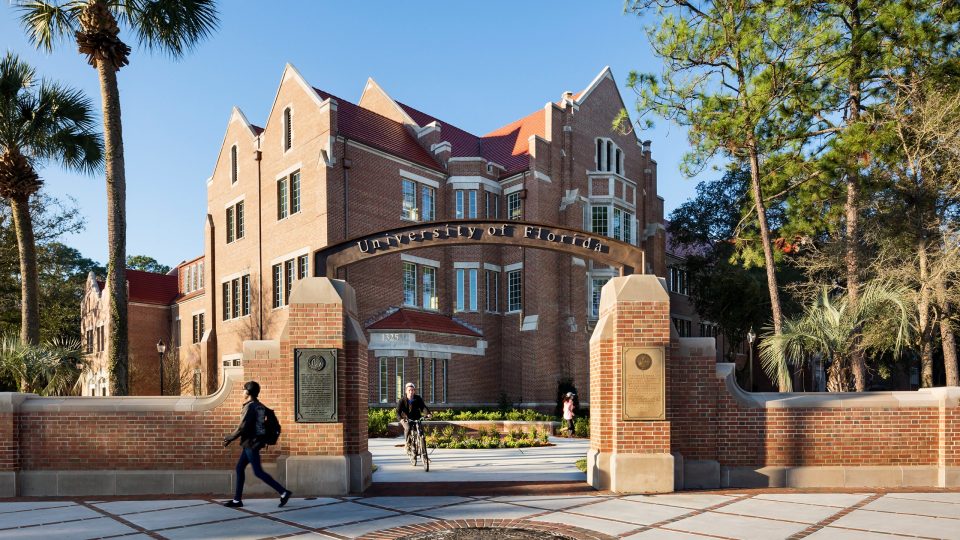
Eduniversal Group handed Florida’s Hough Graduate School of Business some high praise for its various master’s programs.
Eduniversal reviewed 20,000 postgraduate global master’s programs in 50 fields of study, in addition to surveying thousands of students, recruiters, and faculty. Program reputation, salary upon graduation and student satisfaction were the three criteria upon which the rankings are based. For more on Eduniversal and on Hough’s rankings, read here.
The Internet Is Broken. Can It Be Fixed? – Stanford GSB School News & History
Fake news, cybersecurity, and corporate technology’s power structure will be among the topics covered in a new course at Stanford University’s Graduate School of Business.
Anat R. Admati, George G.C. Parker Professor of Finance and Economics and faculty director of the Corporations and Society Initiative, and lecturer Jonathan Dotan, a fellow at Stanford’s Center for Blockchain Research and at the Stanford Compression Forum and a consulting producer on the HBO series Silicon Valley, have designed a multidisciplinary curriculum that will address the regulation and policy issues facing those who live in a tech driven world.
Dotan says of the course’s content:
“The perception of the tech industry has changed dramatically in the past five years … Back then, it could do no wrong. Now it can do no right. Those extremes point to a discussion that we need to have about the role that the internet plays in people’s lives.”
Professor Admati’s approach is more focused on the governance aspects of tech. She says, “I want to understand and help students think through the bigger context of how corporations fit into a system that includes investors, customers, government, news media, and citizens—the whole ecosystem.”
The course, entitled ‘Is the Internet Broken?’ was offered for the first time in spring 2019. For more on the curriculum and its creators, read here.
Former Dean Rich Lyons Named New Campus Innovation Officer – Berkeley Haas News
UC Berkeley’s first-ever Chief Innovation and Entrepreneurship Officer (CIEO), former Dean Rich Lyons, will work to bring Berkeley Haas‘ research in these fields to fruition.
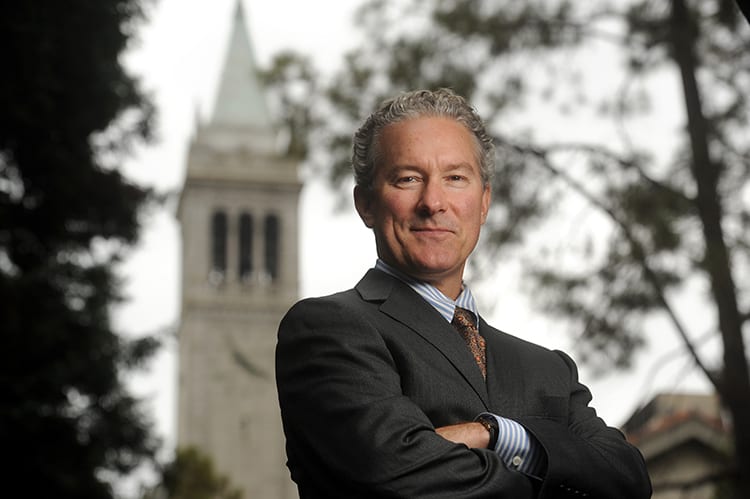
Rich Lyons, new lead of the Berkeley Haas Office of Innovation and Entrepreneurship / Photo via /newsroom.haas.berkeley.edu
Lyons will lead the Office of Innovation and Entrepreneurship in initiating partnerships and acquiring stakeholders to support start up and entrepreneurial efforts on campus. Lyons said of his appointment, “If together we can improve the transformation of Berkeley’s prodigious intellectual product, across the whole campus, into greater societal benefit, then we will have achieved a great deal.”
For eleven years, Lyons served as dean of Haas. He left the position in 2018 and will return after a sabbatical to teaching finance, along with beginning the transition to his new role. Learn more here.
MedTechBOOST Competition to Target Healthcare Challenges Using AI – University of Cambridge Judge Business School News
The Cambridge Judge Business School Entrepreneurship Center, along with corporate sponsors such as Johnson & Johnson and Astra Zeneca, will host a competition aiming to address issues of mental health and wellness in aging using artificial intelligence.
The participants will examine ways in which AI can be used to diagnose, predict, and treat patients. After developing these ideas, they will pitch them to potential investors and collaborators. “MedTechBOOST offers individuals and early-stage start-ups unprecedented access to the NHS and a roster of multinational businesses and investor networks, providing a life-changing experience for anyone pursuing a career in healthcare or AI,” says James Parton, one of the competition’s organizers.
Healthcare professionals, entrepreneurs, researchers, students, and early stage start-ups can apply to take part in MedTechBOOST.com by July 31.
“MedTechBOOST offers individuals and early-stage start-ups unprecedented access to the NHS and a roster of multinational businesses and investor networks, providing a life-changing experience for anyone pursuing a career in healthcare or AI,” says Bruno Cotta, Executive Director of Cambridge Judge Business School Entrepreneurship Center.
Learn more about MedTechBOOST and its participants here.
Top 5 Paying MBA Careers: Finance
Finance, no surprise, is an extremely popular field among MBA graduates. According to Payscale, finance is 4.7 times more popular among MBA graduates than other fields. The reasons for this are rather uncomplicated: its pretty lucrative.
The starting median salary for those with up to five years of experience is $62,100. After ten years, the reported median salary jumps to $120,000; a 93 percent increase. Given that it is finance, the bonuses that employees can earn are massive, making the field even more lucrative.
With such high salaries and the prospect of massive bonuses, those interested in finance might be curious about what the best positions are for them. These can vary by company, experience, and location.
Companies Recruiting Finance MBA Graduates
The firm you work for can affect how much you make. Larger firms tend to offer more than smaller houses. The following are the top five employers in terms of average salary for those with an MBA in finance.
Morgan Stanley: $136,500
Deloitte: $132,656
Microsoft: $123,684
Amazon: $123,678
Citigroup: $121,346
Finance MBA Experience
As one might expect, the more experience one has in a field, the higher their salary will be. According to Payscale, this is a breakdown of average salary based on years of experience.
- Up to 11 Months: $58,517
- 1–4 Years: $65,589
- 5–9 Years: $86,086
- 10–19 Years: $113,775
- 20+ Years: $135,016
Finance MBA Location
Along with company size and experience, location is the other major determinant of salary for finance MBA graduates. Given the fact that finance tends to be centralized in major cities, it is reasonable to assume that the largest salaries are to be found in cities with large, well-populated metropolitan areas. The following are the five cities where MBA graduates can earn the most.
- New York, NY: $120,962
- Los Angeles, CA: $111,727
- Boston, MA: $109,490
- Chicago, IL: $108,421
- Houston, TX: $101,643

For finance savvy MBA graduates, New York City offers the best average salary opportunities in the United States.
Top Paying Finance Careers
While there are many careers from which a finance MBA can choose, the following offer the highest salaries. To maximize a potential salary, one should consider the variables mentioned above when searching for a position.
#1: Vice President, Finance ($135,000–$195,000)
As a vice president of finance, your primary responsibility will be to direct finances and coordinate the budget. The VP of finance also sets goals and oversees lower-level employees in the financial department. Other responsibilities include engaging in accounting, operations, and finance management.
Common tasks include the following:
- Ensuring company financial plans are carried out
- Coordinating, preparing, and reviewing annual reports
- Directing accounting operations
The average salary of a VP of finance is $134,919. In addition, MBA graduates can earn an average of $24,430 in bonuses, $24,566 in commission, and $8,757 in profit sharing. The salary on this job can raise these numbers higher depending on where one works. Look for these positions in the following cities, where you can earn more than the average:
- San Francisco, CA: 28 percent more
- Los Angeles, CA: 16 percent more
- Boston, MA: 15 percent more
#2: Finance Director ($110,000–$160,000)
Finance directors are responsible for managing the goings on in the finance department of the company. In addition, effective finance directors can see problems and risks and design necessary solutions as needed.
Common tasks include the following:
- Overseeing the preparation of regulatory and financial reporting as required
- Developing policies and procedures to control and report financials
- Managing budget, forecast, and accounting preparations
The average salary of a finance director is $111,384. MBA graduates can expect to earn an average bonus of $18,556, $33,000 in commission, and $5,113 in profit sharing. According to Payscale, the following are three highest paying companies for this position:
- Nike: $150,000
- Lilly: $130,000
- CBRE Group: $128,000
#3: Investment Banker ($99,000–$207,000)
As an investment banker, your primary responsibility is to grow wealth for your clients. This can be through either strategic investing or raising capital. Investment bankers look through all of the financial information of a company to develop the best strategy for addressing its concerns and reaching its goals.
Common tasks include the following:
- Constructing financial models to aid in transactions and communications
- Performing valuation analyses
- Conducting industry and company research
On average, you can expect to earn an average of $98,831 in salary. Investment banking is rather lucrative, so it is not impossible to double your salary in commission alone. However, because if this, the salary scale can widely vary. The average commission for this position on Payscale is $90,000. To make that possible, you’ll need to go to a city where capital generation is needed. These three places pay more than the average, according to Payscale:
- San Francisco, CA: 52 percent higher
- New York, NY: 12 percent higher
- Dallas, TX: 5 percent higher

Investment bankers would do well to look into a career in the Bay Area. San Francisco-metro investment bankers make nearly 50 percent more than the national average, according to Payscale data.
#4: Finance Manager ($90,000–$124,000)
Finance managers are expected to watch departmental budgets. Their primary responsibilities include making financial forecasts for their company, working with other departments to establish future budgets, and keeping excellent track of the money going in and out of the company.
Common tasks for people in this position include the following:
- Identifying areas for cost reduction
- Providing analyses to the operations team
- Preparing informational analyses
Given the importance of this position, MBA graduates who pursue it will be compensated well. The average salary for a finance manager is $89,636. In addition to the base salary, an MBA graduate can expect an average of $9,959 in bonuses, $25,006 in commission, and $3,982 in profit sharing.
Because this position is so important, companies are willing to pay excellent candidates well. The following offer the three highest average salaries according to Payscale:
- Boeing: $119,000
- Amazon: $112,000
- Johnson & Johnson: $111,000
#5: Portfolio Manager ($84,000–$140,000)
Portfolio managers are responsible for investing their clients’ money, whether those clients are businesses or individuals. They work to get the highest return possible for their clients’ money.
Common tasks for this position include the following:
- Consulting with clients to develop investment goals
- Reporting on investment performance
- Managing portfolios to maximize returns
Portfolio managers earn an average of $84,443, with $10,274 in bonuses, $10,113 in commission, and $4,000 in profit sharing. According to Payscale, these positions tend to be centered in financial institutions and investment firms.
The following three banks offer the highest average salaries to their portfolio managers.
- Blackrock: $115,000
- S. Bank: $99,000
- Citizens Financial Group: $97,000
#1 Ranked IU Kelley Online MBA Undergoes Major Curriculum Update
Sponsored Content
Already ranked #1 by the U.S. News & World Report, the IU Kelley Direct Online MBA has revamped its program for a more customizable experience. Now, their online program is even more robust while still offering the same flexibility and strengths that have made Kelley Direct a long-time business leader.
As always, the same faculty that teach in the IU Kelley on-campus programs also teach in the Kelley Online program. The Kelley Direct Online program also still includes live case studies within every in-residence week, offers global and domestic immersions, and focuses on quality student experiences.
The purpose of the revamp wasn’t to take away any of the elements that made the online MBA so great in the first place. Instead, the goal was to enhance the curriculum and offer more customization to make the program even stronger.
The Kelley Direct Online MBA now offers students 50 percent electives, seven majors, and a signature integrated core experience focused on business fundamentals.
It’s the next evolution of the online MBA, which goes far beyond what people typically think of for online MBAs.
“The primary motivation for the redesigned online MBA was not to focus on a new market segment, but to update our product and create a significant differentiator from other competitors in the marketplace,” explains Ramesh Venkataraman, chair of the Kelley Direct Online MBA and MS programs.
More Electives for a More Customized Student Experience

A quick glance at the current marketplace tells you that a candidate with specialized knowledge is more valuable than a general management MBA candidate. So, it made sense for the Kelley Online MBA program to update its curriculum to match what employers want, and they did this by drastically increasing the number of electives offered.
“In general, online MBA programs tend to be more core-heavy with less potential for electives,” Ramesh says. “But why should our online MBA not have as many electives as any other product? Specialized knowledge is what the marketplace wants, and our new electives allow students to gain that knowledge and use it as a launching pad in their careers.”
The newly revamped online MBA, which launches this fall, requires students to complete 27 credit hours of core coursework and 27 credit hours of electives—a 50/50 split. It’s a significant change from the previous format, which allowed for just 12 elective credits. The increase—with at least ten different electives in each of seven disciplines—results in a far more customizable student experience that’s aligned with both student and employer expectations.
But don’t worry; to get here, the online MBA didn’t take away from the core knowledge students need. Instead, the new curriculum is far more streamlined. The core material has been compressed into two credit hour classes instead of three, but with the same subject matters and essence.
“They’re not going to lose content,” states Ramesh. “They’re just going to enjoy their core content in a new format.”
The newly revamped online MBA format breaks down the core curriculum into three blocks: understanding markets and institutions; delivering value through functional excellence; and creating and sustaining competitive advantage. Each block includes a trio of 12-week courses with eight live sessions each that leverage technology to get the content out synchronously and asynchronously.
- Core 1: Business law and ethics, economics, and organizational behavior.
- Core 2: Operations management, marketing management, and financial management.
- Core 3: Digital tech and innovation, developing strategic capabilities, and an integrative live case experience.
Though, you should note, the update does mean that there’s a little more overall work. Online students now have to complete a total of 54 credits compared to 51.
However, the hope is that this increased workload will result in MBA students from a wider variety of backgrounds choosing the program thanks to the depth and breadth of their new course offerings, which includes seven new majors.
- Business Analytics
- Entrepreneurship & Innovation
- Finance
- Global Supply Chain Management
- IT Management
- Marketing
- Strategic Management
These majors allow students to choose the curriculum that best reflects their interests and career goals. Now, it’s possible to go deep into a specific business area or industry in a way that wasn’t possible before, providing students with a way to optimize their resume and find the best opportunities for moving forward.
Learning Doesn’t Stop Inside the Classroom. It’s an Immersive Experience with Many Co-Curricular Opportunities.

But learning doesn’t stop in the classroom when you choose the Kelley Online MBA. It’s an immersive experience that helps you build skills and confidence far beyond the curriculum through co-curricular opportunities.
“We know that online MBA students want to build a set of experiences that complement what they do in their online courses, but there’s a lot of variability in terms of what students want to build,” says Adam Herman, executive director of the Kelley Direct MBA and MS programs. “So, we offer a wide range of co-curricular opportunities that students can use to strengthen their professional profile.”
There are four main types of co-curricular activities:
- Experiential learning, including global and domestic immersion experiences as part of credit-bearing courses.
- A robust slate of affinity groups/clubs, both identity-oriented and career field-specific.
- Twice-annual Global Connect Networking Night in 25-30 cities across the globe.
- A suite of high-impact offerings from the career and professional development center.
In particular, experiential learning is a hallmark of the Kelley Direct Online MBA program. From a variety of in-person courses that focus on a particular business area to global and domestic immersion experiences, experiential learning is a highlight of many students’ education.
“Experiential learning is super important to the Kelley Online MBA program,” says Joe Hwalek, a ’19 MBA and associate brand manager for Hyatt Place Hotels, Hyatt Corp. “The greatest experience has been working in smaller teams. You spend an incredible number of hours working and learning from them, and each time, I’ve been awed at the level of professionalism and the solutions that we’ve put together.”
These immersive, educational experiences enrich the online MBA and create life-changing moments where students can make connections and learn by doing.
For example, there’s an annual trip to Washington D.C. that focuses on public policy. Students spend a week at the Washington Campus exploring, site seeing, and learning from the best and brightest individuals in politics.
“The program is fantastic,” describes Elisa Stampf, a ’19 MBA and senior small commercial sales representative at The Hartford. “The first day we were on campus we listened to speakers from all walks of life, backgrounds, and political parties. The next day, we toured Capitol Hill, spent time at the National Press Club, and more. Everything was incredibly relevant, and was an investment that was worth every penny.”
Also worth every penny are the global experiences where students will see the world and gain international economic knowledge and skills to move their careers forward.
MBA Students Are Going to Work in a Global Environment, and Being Online Doesn’t Change that Fact.
“Just because you’re an online MBA student doesn’t change the fact you’re an MBA student in need of international experience,” says Ramesh. “So, the more our students understand what it takes to do business outside the U.S. and in different cultures, the better. Our global experiences are crucial to providing that exposure.”
These Global Immersions typically include 5-6 weeks of online content to give students a deep understanding of business in a rapidly emerging market such as Thailand, India, South Africa, or Cuba. Then students head to their country of study to visit key companies and work on a real-world project. After returning to their homes, students work on—and submit—valuable deliverables designed to meet their clients’ needs.
“Our group was paired with a client and tasked to solve some of their business problems,” remembers Elisa. “We faced some challenges along the way, but we were able to consult with a local MBA student who knew the language and culture and who helped strengthen our experience.”
Even if students choose not to head out on a week-long international trip to a foreign country, they still have the opportunity to gain exposure to global business during their second Kelley Connect Week. During that time, they take on a business case study in a foreign country, which forces them to solve an international business problem, giving every student a global perspective.

IU Kelley MBA students in Vietnam.
Kelley Connect Weeks Are When Students Fall in Love with the Program
Speaking of Kelley Connect Weeks, when you ask students about their most memorable times in the Kelley Online MBA, they’ll always mention these two weeks. As Elisa says, “Kelley Connect Week was when I fell in love with the program and what I was doing.”
In most online programs you rarely meet your fellow students in person. However, that’s exactly the point of Kelley Connect Weeks. You attend these twice during the program for a full week, not a short weekend, allowing you to be completely immersed in the program, city, and school.
“Kelley Connect Weeks immerse you in something bigger,” explains Elisa.
Kelley Connect Weeks are a chance to feel connected to your classmates, professors, and the program on a much deeper level. Students head to Indiana University’s Bloomington campus for a week when they’ll meet faculty and classmates, work on team projects, undergo intensive coursework, and attend networking events. The highlight of the week is the live business case where students work in a team to solve a real client/company problem before presenting their solution to the real company, face-to-face.
“The Kelley Connect Weeks are super rewarding,” says Joe. “I’ve created friendships that I’ll have for the rest of my life. And from a career perspective, my classmates have been a valuable source of advice and networking, ultimately helping me make a career change.”

Top-Ranked Career Services Take Online MBAs to the Next Level
And making a career change is why many online MBA students choose an MBA. They’re looking for a change in their function, industry, location, or promotion—a way to enhance their potential. And that’s why the Kelley’s Graduate Career Services are so valuable.
“We have a five-phase career development model for our online MBA students,” explains Adam Herman. “It begins before the first Kelley Connect Week when students are sent pre-work focused on their career goals. From there, students are assigned a dedicated career coach who works alongside the student and guides them throughout the rest of their MBA program.”
These career coaches regularly check in with their students one-on-one to provide insight, offer feedback, and help with overall career navigation. Combined with online materials, weekly communication, and the ability to take classes delivered by the career services office, students have endless opportunities to impact their career in both small and large ways.
With a 115,000-strong alumni network, there are thousands of ways to make meaningful career connections.
For Joe Hwalek, that meant changing his career twice throughout the course of the program. He started out working at an advertising agency, but what he really wanted was to make the switch to working for a corporation. And that’s exactly what he did.
“I’m very fortunate that throughout my online MBA, I was able to move to another ad agency and then to a strategic role with Hyatt,” Joe explains. “The MBA gave me the knowledge that I needed to showcase myself well and demonstrate my commitment to my career field.”
In the End, It’s All About the Students.
And, in the end, the Kelley Online MBA, revamped or not, has always been about what students can get out of it.
“Our lives are so incredibly unique and diverse, and we get to share those experiences live,” says Elisa. “I now have people across the country and world that I know thanks to this program. And we’ve all been able to help each other in our professional lives. The technology IU Kelley uses does a stellar job of bringing people together.”
“The reason I chose the Kelley Online MBA is the flexibility it gave me, no matter my life stage,” Joe says. “I was able to move homes, change jobs twice, and maintain my lifestyle all while continuing my education. Life is busy, and you never know what will happen, so the flexibility to adjust my schedule weekly was invaluable.”
Choose an MBA where your success is paramount. Learn more and apply at the Kelley Direct Online MBA website.
Full-Time MBA
Michigan State University Full-Time MBA Program Structure
The Michigan State University Eli Broad College of Business MBA is a 61-credit degree that takes 21 months to complete. Three distinct components comprise the program: the core curriculum (31 credits); electives (18 credits); and the MBA concentration (12 credits). Concentration options include finance, human resource management, marketing, and supply chain management.
In total, the program features four separate semesters and a summer break, which includes the optional MBA Education Abroad Experience and the Summer Corporate Internship Experience. Those that do not take the MBA Education Abroad Experience must complete an international business course on the MSU campus. The program begins in the fall.
Curriculum
Within the flexible curriculum structure of the Eli Broad MBA program, students select a concentration and craft their own plan of study with elective courses to support areas of interest that complement their concentration area. The program takes place over 21 months and is made up of three components that ensure all MBA students develop both a strong foundation and subject matter expertise:
MBA Core Curriculum: 31 credits that provide foundational learning.
MBA Concentration: 12 credits that build subject matter expertise in one of four fields: Human Resources Management, Supply Chain Management, Marketing or Finance.
MBA Electives: 18 credits that deepen knowledge in areas of interest to drive relevant expertise to a desired career path.
As a Full-Time MBA student at Broad, you’ll learn by doing. Creativity and innovation are at the heart of our curricular design. Experiential learning opportunities help students maximize their knowledge, develop skills and clarify values by continuously applying what they learn in the classroom to real-world contexts
Class Profile
The diversity of the student population at Broad—in terms of ethnicity, gender, national origin, and professional experience—extends learning beyond classroom opportunities, with each student’s unique background considered an asset to be shared.
The class of 2021 has a cohort of 78 students with an average age of 28. Thirty-seven percent of the class identify as female, 32 percent are international students, 23% are minority students and 12% are military veterans. The average work experience of students is 4.7 years and the average GPA and GMAT are 3.3 and 674 respectively.
Careers
Eighty-two percent of the most recent class accepted job offers within 3 months of graduation. Their average starting salary was $110,311 with an average signing bonus of $21,429.
Full-Time MBA Rankings
• U.S. News & World Report: 40
• Financial Times: 43
• Forbes: 27
• The Economist: 35
Tuition, Scholarships, and Financial Aid
Getting the most for your investment and finding the best overall value are serious considerations. Paired with Broad’s pricing structure and the adjunct cost of lodging, food and travel, you owe it to yourself to take a close look and learn more about our program cost and tuition, available fellowships and scholarships, and financial aid opportunities.
Our focus is always on ensuring that, throughout your entire Broad experience and throughout your career, you maximize return on yourself. For added curriculum flexibility, the Broad MBA program offers a block tuition structure. Students may take up to 18 credits per semester, with a maximum enrollment of 68 credits in the four semesters of the MBA program. Through periodic meetings with the MBA advising team, students choose a mix of required and elective courses to create their ideal degree plan.
In State – $33,098
Out of State – $52,458
International – $52,458
The Broad full-time MBA program awards more than $2.6 million in competitive, merit-based fellowships and graduate assistantships each year to first- and second-year MBA students.
All applicants are automatically considered for fellowships and graduate assistantships. Applicants should apply early in the admissions year to be most competitive. Notification of a fellowship award for incoming students follows an offer of admission. Fellowships typically range from $2,000 to $31,000 per year for two years.
Admissions
The Broad Full-Time MBA program requires all applicants have completed a four-year undergraduate degree, or an international U.S. bachelor’s equivalent. Candidates who hold a three-year undergraduate degree along with a master’s degree are also eligible to apply.
Prospective students are strongly recommended to have a minimum of two years’ full-time work experience after a candidate has earned an undergraduate degree. The average admitted student has four years’ work experience. The admissions team occasionally will consider applicants with nontraditional full-time work experience prior to or during their undergraduate program.
All applicants must take either the GMAT or the GRE. The average GMAT score for the Class of 2021 was 674. We do not have a required minimum score. A GMAT or GRE score alone does not guarantee or deny admission to the program.
Note: The Broad Full-Time MBA program is conducting a pilot this year to accept domestic candidates with strong work experience and other admission criteria in lieu of the standardized test score.
The GMAT/GRE is required in order to receive a scholarship. However, a waiver is available to those meeting the following requirements:
• At least four years of progressive, post-bachelor’s work experience
• An additional interview by a Career Management Professional
• Strong recommendation from a supervisor
• Successful completion of non-credit online pre-requisite courses post-admission (during summer)
In addition, applicants must provide the following:
• A completed application
• Official transcripts
• A current resume
• Two essays (one written, one video)
• Two professional recommendations
• English language test scores (if needed)
• $85 application fee
Application deadlines are as follows:
| Round | Early Round | Round 1 | Round 2 | Round 3 | Round 4 |
|---|---|---|---|---|---|
| Application Deadline | October 4, 2021 | November 8, 2021 | January 10, 2022 | March 7, 2022 | April 4, 2022 |
| Decisions Mailed By | November 12, 2021 | January 14, 2022 | March 11, 2022 | April 8, 2022 | May 13, 2022 |
International MBA
UBC Sauder School of Business International MBA Structure
The UBC Sauder School of Business’ Robert H. Lee Graduate School International MBA is a 20-month part-time program taught at the Antai College of Economics and Management at Shanghai Jiao Tong University. The program is designed for Chinese business professionals seeking an global academic experience, complete with a trip to Vancouver.
Students start the program in November, with eight foundational courses, taught in Shanghai. In April/May of the first academic year, students complete the mandatory Vancouver, Canada residency, before returning to Shanghai to complete their Capstone project. Students also have the option to return to Vancouver to attend a graduation ceremony.
Classes are taught mostly on weekends. Friday classes last from 3:30 – 10 p.m., with Saturday and Sunday classes running from 9 a.m. to 5 p.m. Individual classes are taught over one weekend, with exams taking place on the first day of the successive class.
Curriculum
The IMBA foundation courses, taught at Jiao Tong University, include the following:
• Business Strategy
• Corporate Finance
• Foundations in Accounting
• Foundations of Managerial Economics
• Marketing
• Operations & Logistics
• Organizational Behaviour
• Statistics
• Integrated Project
These courses are completed from the first month of the program, beginning in November, until July. At the end of April, students complete the two-week residency at the Vancouver UBC campus. The final 12 months of the program are comprised mostly of advanced courses, of which include:
• Accounting
• Financial Reporting
• Financial Statement Analysis
• Entrepreneurship
• Finance
• Investments
• Human Resource
• Managing Change
• Two Party Negotiations
• Brand Management
• Services Management
• Supply Chain Management
• Process Fundamentals
• Strategy
• Corporate Strategy
• MIS
• Managing Information Technology
Like the full-time and Professional MBA options at UBC Sauder, students in the IMBA program complete Career and Professional Development programming through entirety of their schedule, of which includes workshops, networking events, and more. An additional Global Network for Advanced Management module may be available for select students, allowing them to travel abroad even more for their global education.
Class Profile
The average age of the UBC Sauder International MBA class is 34-years old. About 42 percent of the most recent class is male, with 58 percent female students. In total, the class featured 45 students. The average amount of previous work experience is 11 years. More than 90 percent of the class originate from China.
Tuition, Scholarships, and Financial Aid
The total cost of the UBC Sauder International MBA program is $60,000 USD, payable in two separate installments. An additional $2,500 fee is required to hold a spot in the program. Additional costs are as follows:
| Expenses | Cost (USD) |
|---|---|
| Optional Prep Program Fee | $150 for each individual course, or, $400 for all three |
| Optional Global Network for Advanced Management (GNAM) | $5,600 |
| Vancouver Flight | $1,000 |
| Accommodation in Vancouver | $2,100 |
| Medical Insurance | $100 |
| Transportation | $80 |
| Food and Other Expenses | $700 |
The total estimated cost, with all other fees, insurance, travel, and miscellaneous factors included, is about $69,980.
Outstanding students may be rewarded a UBC International MBA Entrance Scholarship, which can range anywhere from $1,000 to $6,000. The range of the scholarship is dependent upon the time of application, with earlier applicants given higher scholarship opportunities.
Private and federal loan funding may be available, per student.
Admissions
In order to apply to the UBC Sauder International MBA program at the Robert H. Lee Graduate School and the Antai College of Economics and Management at Shanghai Jiao Tong University, applicants must have earned a three-or-four year undergraduate Bachelor’s degree from an accredited institution while maintaining a GPA of at least a ‘B+’ (76 percent or 3.3). There is no minimum GMAT/GRE score requirement, but the suggesting GMAT minimum is 550 and in the 50th percentile for each test section. GRE scores should be at least 155 for the verbal and quantitative sections. At least two years of full work experience is also required. However, it is suggested that applicants have at least five years of prior experience.
Applicants must also be able to speak fluent English in order to enroll. For those who did not earn an undergraduate degree in Canada, the U.S., or UK, or didn’t earn a degree from a predominantly English-speaking academic institution, TOEFL/IELTS/CAEL scores are required. Applicants must score a minimum of 80 on the TOEFL exam, 6.5 on the IELTS, or 70 overall on the CAEL.
The following must also be submitted:
• A completed online application
• Official transcripts
• $143 CAD application fee
Application deadlines are as follows:
Round Two – June 11, 2019 (final deadline for scholarship consideration)
Final Round – August 27, 2019
Friday News – Sweetgreen Comes to Georgetown, Merage Honors Digital Transformation, and More
Let’s take a look at some of the biggest stories from this week, including the Sweetgreen founders returning to their alma mater, Georgetown McDonough.
Center for Digital Transformation Selects Top Companies for Digital Innovators Award – Merage School of Business News
The Center for Digital Transformation at UC Irvine’s Merage School of Business named three companies that exemplify the center’s mission: “Advancing the competitiveness and productivity of business in the digital economy.”
Using responses from its annual survey, the Center selected Target, Aetna/CVS Health, and Quad/Graphics for work in reinventing themselves to compete in the digital economy. The six elements of each business that the Center observed were the companies’ culture of innovation; the level of technical ability of the workforce; how well the companies apply digital technologies; strategic vision; and the investments the companies made in new technology.
Vijay Gurbaxani, the Director of the Center for Digital Transformation, says “Our survey examined 150 companies, but among them, these three companies stood out. Transformation is especially challenging for legacy companies—[those] incorporated before 1990—because they have to change in fundamental ways that younger, natively digital companies don’t.”
The winners were honored at this year’s annual Road to Reinvention Conference, along with a dinner on March 20, 2019. For more on the Center and the conference, click here.
Sweetgreen Founders Reflect on Success – McDonough School of Business News
The founders of fast casual salad chain Sweetgreen visited their alma mater, McDonough School of Business at Georgetown University, to discuss the evolution of their company. The event, which took place on April 16, 2019, was part of McDonough’s Stanton Distinguished Leaders Series.

Georgetown McDonough School of Business alumni Jonathan Neman (B’07), Nicolas Jammet (B’07), and Nathaniel Ru (B’07), seen above, speaking at their alma mater on April 16 / Photo via msb.georgetown.edu
Jonathan Neman (B,07) says, “We found this niche in the market where there was an opportunity to have something that was fresh and healthy, but also affordable and fast.” Noting that he and his partners were challenged to find any healthy food choices on campus, Neman continues, “We wanted to figure out how we could create something essentially for ourselves in the beginning.”
Neman’s classmates, Nicolas Jammet and Nathaniel Ru came up with the idea during their senior year at Georgetown. After being turned down for funding, they decided to crowdsource from a reliable audience: friends and family. The team gathered $300,000 in funding and the company took off. Initially called ‘Greens’ the original location of the restaurant was on campus
With social impact at the heart of Sweetgreen’s business model, the founders have begun several initiatives involving sustainable farming and access to healthy foods for underserved communities. The company also seeks to reduce waste at every level of production.
New Study On Ways to Inoculate Teens Against Junk Food Marketing – Chicago Booth Newsroom
A professor at the University of Chicago’s Booth School of Business recently published research on the affects of junk food marketing on adolescents.
Professor Christopher Bryan, along with the other members of his research team, discovered a method to protect teenagers, (especially boys, who are most susceptible), against the harmful effects of food marketing. The study, which took place in a Texas middle school, presented students with an exposé-style piece on corporations that manipulate consumers to make unhealthy choices. The stories revealed facts to the students about how addictive junk foods are marketed to poor and vulnerable populations.
Another group of students were given more traditional marketing materials about the benefits of healthy eating. The first group made, on average, more healthy decisions at the cafeteria on subsequent days. Professor Bryan says, “What we’ve done is turn that around on the food marketers by exposing this manipulation to teenagers, triggering their natural strong aversion to being controlled by adults. If we could make more kids aware of that, it might make a real difference.”
The study, “A Values-Alignment Intervention Protects Adolescents from the Effects of Food Marketing,” was published in mid-April.
The Fox School is Hitting the Road – Fox School News
Temple University’s Fox School of Business is launching a new alumni event called “Fox on the Road,” with the goal of providing professional development and networking opportunities in New York, New Jersey, Delaware, and Maryland.
The events will feature keynote speakers on trends and topics in their industries. More details are coming soon, and Fox is seeking input on how the series can be most useful to alumni.
Upcoming events this spring include a joint effort with Wharton Alumni of Philadelphia at WeWork on 5/1, an Alumni Association Cheer Station at the Broad Street Run on 5/5, and a TedX Philadelphia talk on 5/15. The TedX Event’s theme will be “Unintended Consequences.”
Penn State Smeal College of Business names two new members to Board of Visitors – Penn State Smeal News
Penn State Smeal’s College of Business has announced two new members to its Board of Visitors, which advises faculty and administrators on strategic decisions and trends in each member’s industries.
Smeal alum Farid Alias is President and CEO of Maybank in Malaysia. He received the Penn State Alumni Association’s Alumni Fellow Award, the organization’s highest honor, in 2017. Jerome Griffith, who earned his bachelor’s degree from Smeal in 1979, is the CEO of Land’s End.
Smeal Dean Charles Whitema says of the appointments:
“Both Farid and Jerome have significant C-suite experience that I expect will enhance the programs and services we provide for Smeal students…I look forward to the contributions they will make in the years to come.”
Farid Alias was named CEO of the Year at the ASEAN Business Awards Malaysia in 2015 and was awarded the CNBC Asia Business Leader Award for Corporate Social Responsibility, also in 2015. He is Vice Chairman of Asian Institute of Chartered Bankers, and is also a member of the ASEAN Banking Council, the Asian Banker Association, and the Visa Senior Client Council Program. Griffith formerly served in executive positions at Esprit, Tumi, Tommy Hilfiger, and the J. Peterman Company.
Click here for more on other members of the Board of Visitors.
Company Battle: Morgan Stanley vs Credit Suisse
MBA graduates on the prowl for post-graduate employment opportunities would do well to investigate international banking giants Morgan Stanley and Credit Suisse, both of which offer many attractive perks to employees.
New York City’s Morgan Stanley primarily handles the investments and assets of governments, corporations, and institutions. Zurich, Switzerland-based Credit Suisse is highly regarded for its bank-client confidentiality and overall discretion with regard to client information.
Morgan Stanley vs Credit Suisse: Salaries
The most common entry-level position for MBA graduates is as an associate. Luckily, associates are compensated handsomely at both companies.
Morgan Stanley offers an average salary of $108,659 according to Glassdoor data, with the possibility of an additional $21,732 in bonuses, on average.
Credit Suisse remains competitive with Morgan Stanley at an average annual salary of $111,572 and an average overall pay of approximately $112,000. However, there is the potential for healthier bonuses at Credit Suisse, with a ludicrous average bonus pay of $67,980. Still, reviews from current and former Credit Suisse employees on Glassdoor seem to suggest that bonuses are actually few and far between. Whereas reviews from Morgan Stanley employees suggest that they are more generous.

Morgan Stanley vs Credit Suisse: Company Culture
Credit Suisse and Morgan Stanley actively fosters inclusion in the workplace, with a number of key diversity initiatives. In addition, both banks have implemented innovative strategies to demonstrate corporate responsibility and philanthropy.
Credit Suisse offers several employee networks designed to foster collaboration, including networks for family, women, veterans, LGBT professionals, and POC professionals. Additionally, Credit Suisse offers the Real Returns™ Program, which offers senior bankers the chance to return from an extended career break.
Morgan Stanley also encourages their employees to volunteer regularly, as exemplified by its Global Volunteer Month, the most recent iteration saw 48,000 employees in 36 countries volunteer over 262,000 hours of their time.

Morgan Stanley’s Vice Chairman Tom Nides and Chief Human Resources Officer Jeff Brodsky, shown with over 300 volunteers during the company’s 2018 Global Volunteer Month.
Credit Suisse is known for its collaborative working environment and flexible working hours. Morgan Stanley, on the other hand, promotes a supportive workplace culture, but work occurs at a much faster pace and over longer hours. Some might find the fast-and-furious approach preferable, as it offers more learning opportunities, but it can be difficult to maintain a healthy work-life balance.
Both banks rank highly by various publications on workplace cultures, but Morgan Stanley seems to consistently come out on top. According to Vault, Credit Suisse ranks at 19th as the best place to work, whereas Morgan Stanley comes in 4th. eFinancialCareers also ranks Morgan Stanley as the 4th most ideal employer, citing its competitive bonuses and salaries, as well as its progressive initiatives on issues like workplace diversity and corporate social responsibility. Despite their attractive salaries, positive office environment, and accommodating working hours, Credit Suisse comes in slightly behind at 10th. Finally, Glass Door ranked Morgan Stanley at 100 overall in its 2019 list of ‘Best Places to Work.’
Morgan Stanley vs Credit Suisse: Hiring Rates and Versatility
Morgan Stanley features over 57,000 employees, spread out over 41 countries. There are opportunities to work in North America, Europe, the Middle East, Africa, Japan, and Asia Pacific.
Credit Suisse features 46,840 employees working across 50 different countries. However, a number of positions are only available in Switzerland. In spite of these figures, Credit Suisse claims that there are still many opportunities for mobility, both internally (with respect to opportunities to work across departments as well as potential promotions) and geographically. In 2017, 4,100 employees made an internal move and 47 percent of vacancies were filled internally.
5 Questions with the MBA Admissions Team at UIC Liautaud Graduate School of Business
In our latest installment of the MetroMBA “5 Questions” series, we speak with Alanna O’Connor, Assistant Dean for Student Recruitment for the Full-Time MBA Program at the University of Illinois at Chicago Liautaud Graduate School of Business. O’Connor talks about the many new opportunities, programs, and events taking place at Liautaud this year and beyond. She also gives advice for candidates interested in applying to the MBA program, insight into outside-the-classroom opportunities, and her pick for best Chicago deep dish pizza.
Are there any new programs, centers, faculty members, or events you can talk about?
“Under Dean Michael Mikhail, our faculty body has grown 35 percent. In fact, more than 50 percent of our tenure-track faculty have been hired since he assumed the deanship in 2012 and many have been quoted as experts in national publication including WBEZ (Chicago’s NPR affiliate), The New York Times, Harvard Business Review, Forbes, and The Chicago Tribune.
The UIC Business Institute for Leadership Excellence and Development (iLEAD) is disrupting traditional classroom notions. This one-of-a-kind experience gives students a competitive edge with teaching professional development courses incorporating innovative approaches such as improvisation.
This spring UIC Business launched a new master of science degree program in supply chain and operations management, or MSSCOM. This program is exemplary of a curriculum designed for tomorrow’s supply chain professional. Led by our extraordinary faculty, the MSSCOM offers students a core set of courses in operations management, data, and supply chain management and expertise in the skill set employers seek.
In terms of events, connecting with our campus to determine fit is an essential part of a prospective student’s B-School research. UIC Business offers information sessions and lunch and learns, Open House events, webinars, classroom visit opportunities, and the chance to connect one on one with a recruitment advisor, current student, or faculty member. Understanding our prospective students have busy lives, we offer many opportunities to meet in person, by phone or virtually.”
What is one area of the UIC Business Liautaud Graduate School MBA student experience that you want applicants to pay attention to?

The Liautaud Graduate School of Business at UIC is located just several blocks from the picturesque Chicago River.
“UIC Business is just steps away from Chicago’s business district, which is an asset for our students in terms of internships and jobs. But our faculty are preparing students to compete in a global market through a quantitative approach to business that ensures our students have not only the management skills they will need, but also the facility and comfort with data and analysis to be competitive hires and successful 21st century business leaders.”
What opportunities, outside of the classroom, does the UIC Liautaud Graduate School offer MBA students to get hands-on experience?
“Through the MBA Capstone project, MBA students partner with local businesses and organizations and use the analytic and problem-solving skills they have developed to address the enterprise level challenges of firms. Our dedicated Business Career Center regularly hosts firms for visit days as well as Career Fairs, and Career Advisors provide one-on-one personal support in resume development, mock interviews, and job searches. Speaker series like our Leadership Breakfast, Executives in the Boardroom, and Alumni 4 U give students the chance to learn from and network with business leaders.”
What advice would you give an MBA candidate interested in the UIC Liautaud Graduate School of Business?
“Graduate school is an investment of your time and energy, and the return on that will be measured for you personally and professionally. UIC Business is an AASCB program located in Chicago’s top public research university. With our connections to Chicago’s business world, prime location, faculty experts teaching in-demand subjects, and thriving network of alumni, your life will be enriched with the knowledge and skills you gain and the people you meet who are interested in helping move your career forward. Get involved beyond the classroom with student organizations, utilize Business Career Center services, go to our special speakers and events series, and make time for fun at UIC Business sponsored social networking opportunities.”
Where can you get the best Chicago pizza near campus?

Chicago’s famous (and infamous) Giordano’s deep dish pizza is near the Liautaud campus.
“This can be a sensitive question because there are so many options depending upon how you like your slice, and whether you want to dine-in or carry-out. There are over 900 spots to get a slice of pizza within the UIC zip code. But if we had to pick just one true Chicago pizza, our choice for best would go to Giordano’s for its taste and authentic Chicago style.”
Top MBA Recruiters: S&P Global
In 1869, Henry Varnum Poor published an investor’s guide to the American railroad industry. As it approaches its 160th year, New York City‘s S&P Global, the company that bearing his name, is an elite firm that organizes an index fund for the stock market and provides important financial information to businesses around the world.
S&P Global is one of the largest financial analytics firms in the world, which means that many MBAs who aspire to roles as quants should read on.
Why MBAs Love S&P Global
For those familiar with the Wall Street Journal, S&P Global’s massive international presence in the financial market is hard to miss. MBAs who want to pursue international opportunities or return to their home countries can find many opportunities with S&P Global, operating 65 offices spread across six continents.
Given the prominent position in finance, S&P Global offers extremely competitive wages to its employees. According to Glassdoor, MBAs who begin their careers at S&P Global as associates can earn an average of $110,397, with an additional $15,000 in cash bonuses.
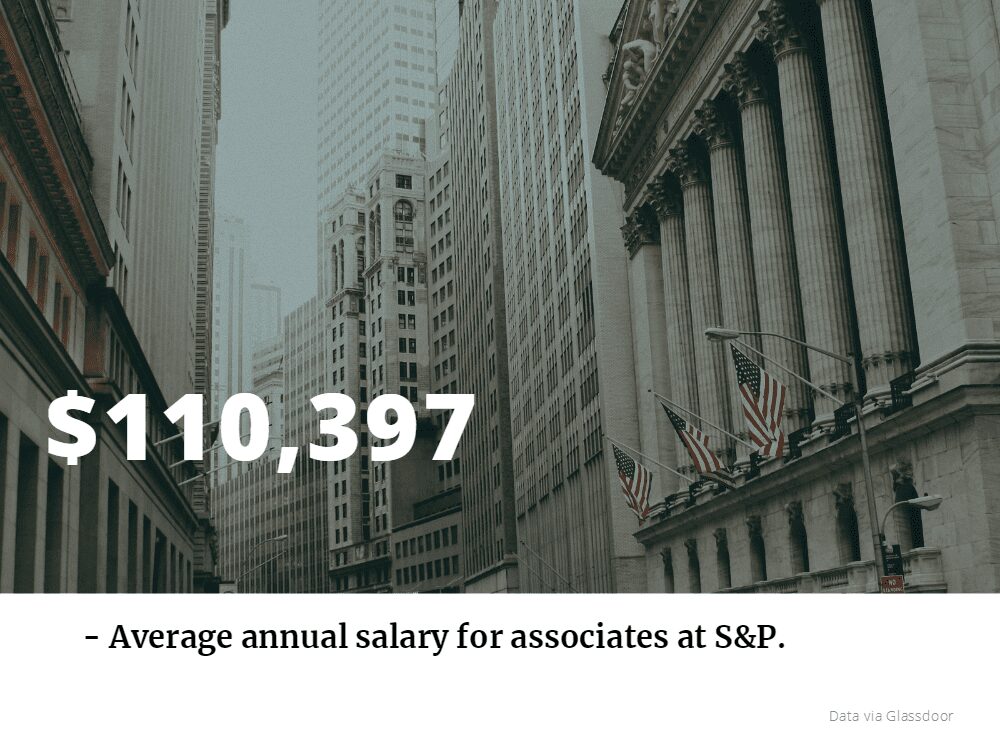
Life at S&P Global
S&P Global and S&P Global Market Intelligence both emphasize strong work-life balance and benefits. In addition to comprehensive health, vision, dental, and retirement benefits, S&P provides employees with support for child and elder care, adoption assistance, and a maternity management program for new mothers. S&P also offers employees a $5,000 refund for continuing education courses.
Another major benefit that employees extol is the high quality of their colleagues, who are described as extremely smart and open to collaboration. Some also mention how S&P Global is a fantastic place to learn about the business and get a foothold in the field.
Landing a Job at S&P Global
The firm operates on three primary principles: relevance, integrity, and excellence. S&P also seeks candidates who embody the following leadership qualities:
- Operate outside-in
- Elevate people
- Adopt a worldview
- Drive performance
- Speak the truth
- Execute with discipline.
It is critical that all prospective employees to understand what these values mean to them and how they can be applied to their work at S&P Global.
The application process is rather straightforward. For example, prospects for the associate position are first screened through a 30-minute phone interview. If the phone interview is passed, candidates are called in for a series of interviews and a two-hour in-house rating assessment, which requires that the candidate writes a one-page recommendation based on information provided to them by the firm.
As noted above, throughout this process, the firm attempts to assess the candidate’s fit within the S&P Global culture. S&P also looks to ensure that candidates have the technical skills necessary to thrive in the job if hired.
The best candidates will have made contact with current employees to review what systems are being used at S&P Global, particularly in their desired area of employment, and will know how their experience and mentality fits with the firm’s values and principles.
Current S&P Global Jobs Openings
The company is currently looking for a litany of MBA talent in and outside of the United States. There are over 300 openings at S&P Global Market Intelligence alone. Just last week, the following positions opened up:
Sales Associate – Investment Banking/Private Equity – New York City, U.S.
While this position does not explicitly require an MBA degree, the company notes that is preferred, in addition to “Investment Management, Hedge Fund, Private Equity and Investment Banking space.” Business school grads with a passion for sales are prime for this role, who will need to “identify key decision makers and influencers with target prospects and execute sales strategy collaborate with sales members, client services, product management, operations, technology, and legal to optimize product and service delivery.”
Product Manager – Digital Storefront – New York City, NY or Charlottesville, VA or Centennial, CO, U.S.
For business school grads less interested in the art of sales and more inclined to the world of strategy, a Product Manager role may be perfect. The role looks for people who can “build out a new digital storefront for all of our data sets products. You will work alongside S&P Global Technology, Commercial, Content and Operation teams to define executable business requirements that are aligned with Clients needs as well as the broader S&P Global strategy and goals.”
An MBA degree is not a requirement for the position. Rather, in line with the experience many MBAs have already earned by the time they earn a degree, the Product Manager should have at least three years of business analysis or project management experience, and four to six years of business experience in general.
Marketing Manager – New York City, U.S.
Business grads with at least five years of related experience may be very interested in the company’s Marketing Manager role in New York. They’re looking for candidates that can craft a compelling marketing narrative, working alongside the sales, research, and product teams, helping to build the brand.

